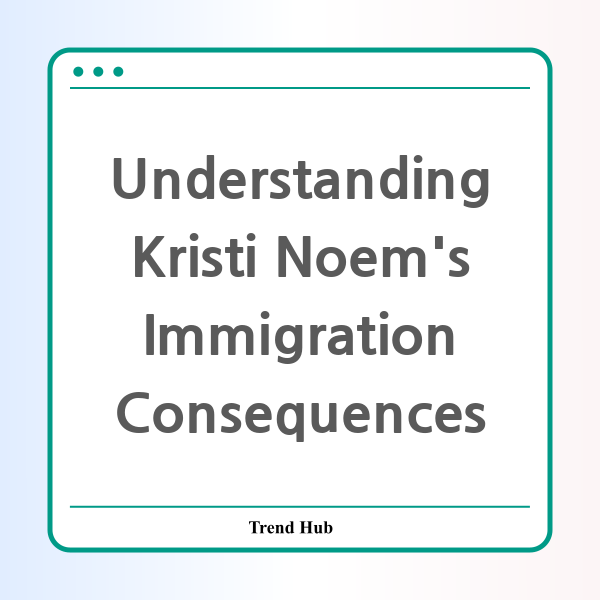* This website participates in the Amazon Affiliate Program and earns from qualifying purchases.

As tensions surrounding immigration policies continue to rise, Secretary of Homeland Security Kristi Noem has made headlines with her recent statements regarding the U.S. Customs and Immigration Enforcement (ICE) operations. What does this mean for immigrants and their families? Are the consequences being enacted truly reflective of a fair immigration system?
During an immigration raid in Virginia, Secretary Noem highlighted the "consequences" ICE aims to enforce against individuals who are illegally in the country, focusing particularly on those with criminal records. In her words, the administration is targeting "the worst first." This approach raises critical questions about the broader implications for family units and children who may find themselves entangled in these immigration operations.
On that Tuesday morning raid, officials arrested individuals associated with serious crimes, including members of gangs and those previously deported. While such enforcement actions may aim to uphold the law, it also brings to light how vulnerable family members, especially children, become in these situations. In the case highlighted by Secretary Noem, two minors, who are American citizens, found themselves in a home where a deportation was imminent.
Secretary Noem stated that time is being given for the detained individuals to ensure their children are placed in safe hands, which acknowledges that family separation is a significant concern. The reality, however, is that for many families caught in these raids, the uncertainty can be devastating. The question arises: what safeguards are in place for these children who are American citizens? While Noem insists on the need for a better environment for them, the prospect of family separation is troubling.
Moreover, the administration's focus on enforcing laws against those with criminal backgrounds raises another layer of worry regarding the overall impact on immigrant communities. Critics argue that while it is vital to address crime, the sweeping nature of these operations often results in innocent individuals getting caught in the crossfire. Families from immigrant backgrounds report feelings of fear and anxiety as they navigate their daily lives under the shadow of potential raids.
The ongoing discourse surrounding immigration enforcement is complex and multifaceted. Individuals like Secretary Kristi Noem play a pivotal role in shaping these policies, and understanding the human aspect of these decisions is critical. The ramifications of the policies can extend far beyond the individuals directly involved, affecting entire communities and future generations.
As the administration continues its crackdown on undocumented individuals, it is essential to scrutinize the balance between law enforcement and compassion, especially towards families and minors. The responsibility lies not only with the enforcement agencies but also with policymakers and society at large to ensure a fair immigration system that respects human dignity.
As we navigate these challenging waters, one must remain informed and engaged. The dialogue surrounding immigration is not just about policy; it is about people’s lives and their stories. For families affected, the question remains: are the consequences truly justified, or is there a need for a more humane approach to immigration in the United States?
* This website participates in the Amazon Affiliate Program and earns from qualifying purchases.